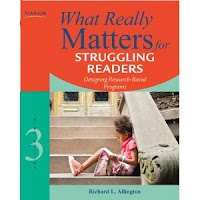I will do a few posts over the next couple days about this topic, so I don't have to make one incredibly long post... plus sitting here that long would mean I would probably eat this entire bag of M & M's.
When I do training with teachers in our district or do presentations at conferences, there are certain questions that come up over and over again. Some of the most popular questions I get...
1. How do you assess your struggling readers?
2. How do you know what to focus on first?
3. Can you recommend specific books/resources that give you practical strategies/activities to use with struggling readers?
How do I assess my struggling readers?
(Here are the assessments that I do. They are done in this order with each student.)
letter identification
letter sounds
phonemic awareness
developmental spelling inventory (I use the Ganske version.)
running record (to determine their independent and instructional Fountas/Pinnell level)
Dibels - This is done district wide and is used as a universal screener. I don't find it very useful, but it is required.
After reviewing all of the assessment data, I determine specific goals for each student. If a student knows all of their letters, then I work on the sounds. If a student knows all of their letters and sounds, then I work on any of the phonemic awareness skills they may be lacking. If they have the phonemic awareness skills down, then I examine their developmental spelling inventory results to find a specific area of need within that assessment. I use the sheet below to give myself a snapshot of my entire class (or caseload) as I determine the targets that I should focus on from the spelling inventory. I simply write each students name in one of the boxes depending on their individual goal. Then I can group students more easily for word work while I am planning.
Finally, each student is assigned an independent reading level for practicing at home and during independent reading time. I provide instruction at their instructional reading level while they are working with me in a small group.
Here are my favorite books for professional reading about working with struggling readers. You can click on the image to read the description from Amazon. The 1st book really describes the importance of giving specific attention to struggling readers and talks about the research based best practices for helping struggling readers.
This book gives specific information about strategies and activities to use with struggling readers. It also has a copy of the developmental spelling inventory and gives you information about each stage of development within the inventory (plus suggested activities for each stage). This book also talks about the importance of doing picture sorts, sound sorts and word sorts.
Ok... I ate way too many M & M's already. Tomorrow, I will post about my Top 5 tips for working with struggling readers.
























LOVE words their way!
ReplyDelete=)
mrs tabb
First Grade Awesomeness
Thank you so much. I am also a first grade teacher and have my masters in elem. literacy. You have the job I would love to have... I am learning lots of new things this summer that I will be sharing with teachers at my school in the fall so I will be reading your blogs with intense interest (and maybe some M & M's...) Liz
ReplyDeletelparce@hotmail.com
Thank you so much! I am moving to third grade in Sept. (from 1st) and can still apply all of these steps. Great refresher and you are so kind to share.
ReplyDeleteThank you for your knowledge. I look forward to reading your future posts.
ReplyDelete